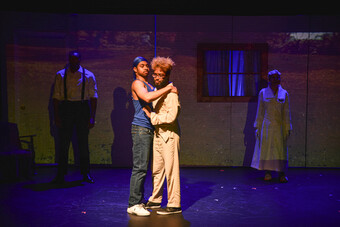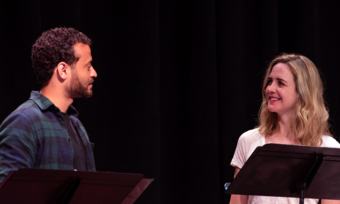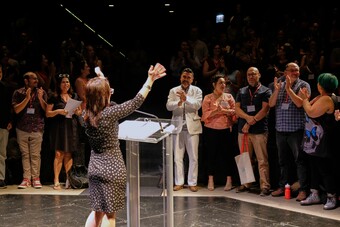The Evolution of the Icicle Creek Theatre Festival
I came to Seattle in September 2005. Invited to ski in Leavenworth, WA, a lovely town in the foothills of the Cascades two hours from Seattle, I was struck by how perfect the venue was for the kind of innovative, cutting-edge theatre work I wanted to do. The following fall I founded the Icicle Creek Theatre Festival (ICTF), to develop new plays that have not been previously produced.

Getting the project off the ground was a great challenge, and I devoted countless hours to making it happen. I wrote a successful grant proposal and the Icicle Fund agreed to back me. Summer of 2007, I created and managed the project single-handedly (play solicitation, play selection, casting, bookkeeping, et al.) and was thrilled at the success of its first outing. I was fortunate to have been able to parlay that first season into four more successful seasons; I’ve been serving as its artistic director for six years.
We obtain plays by working with Seattle’s ACT: A Contemporary Theatre to solicit plays from all over the country, generally from up-and-coming young playwrights. After we receive the plays, a committee of readers—composed of myself, ACT’s Literary Manager Anita Montgomery, and others from the theatre community—read the plays over a period of roughly eight weeks. We have meetings in which we analyze and discuss the plays, and by the end of the sessions we reach consensus on the two that will likely most benefit from our process.
We implemented a new script submission policy in 2010 since the size of the response from playwrights had put tremendous stress on ICTF, preventing us from being able to read and adequately consider all submissions. ICTF switched from an open to an invitational policy which allowed us and ACT to focus time and attention on the invited playwrights and their work. This enabled us to hold longer, more in-depth conversations with playwrights before the workshops began, thus creating stronger working relationships and outcomes. We currently extend invitations to about thirty playwrights.
There are many things we look for when evaluating scripts. We are partial to plays that take points of view on social and other issues—plays that reveal larger truths by their exploration of specific characters in specific situations. We look for compelling narratives. We look for real freshness of ideas, and the sound of unusual new voices. And we are very much drawn to playwrights who have a superb command of language.
We also, without censoring, must consider the sensibilities of the communities who will be hearing these plays. We are thrilled to push the envelope, but we don’t wish to completely offend our audiences. We look for plays that have definite commercial prospects, since we want all our plays to be produced (and soon) in theatres.
We face difficult casting-related issues as well when making our selections. The talent pool here is not diverse, and more importantly, our acting company must successfully “double” in both plays.
Lastly, we look for two plays that complement each other, in order to make the pairing of offerings feel balanced.
In June we audition the best actors in Seattle and secure an acting company. Every August, our playwrights fly in and head to Leavenworth. Our troupe of sixteen—actors, directors, dramaturgs, playwrights, stage manager, company manager, etc.—then spend a week more-or-less sequestered on Icicle Creek’s grounds at the base of Sleeping Lady Mountain. That remarkable week affords the playwrights an opportunity to be completely immersed in working on their plays without any distraction, and with a creativity that is stimulated by the environment there. At week’s end, we present the plays at Icicle Creek then head home to Seattle to present them at ACT.
The plays we’ve workshopped have met with one degree of success or another. Pilgrims Musa and Sheri in the New World by Yussef El Guindi was produced, and recently won the coveted Steinberg Award. Samuel D. Hunter's The Whale won the Sky Cooper New American Play Prize and received a full production at the Denver Center Theatre Company. Mia Chung's You For Me For You will receive a production at Woolly Mammoth Theatre Company this fall.
There’s nothing in the theatre world more important than a commitment to, and devoting resources to, new play development.
Seattle’s become very important, theatrically, on a national level so it’s a great place to be involved with developing new work. There’s nothing in the theatre world more important than a commitment to, and devoting resources to, new play development. Our playwrights receive an invaluable opportunity to develop their plays in a setting that is enormously conducive to their process. What we offer is extremely rare. There are very few play development organizations that offer playwrights the kind of support and experience that we do.
I deeply believe in our mission to advance the American theatre by offering playwrights opportunities to develop their work. I’m dedicated to making Icicle Creek a nationally known performing arts program and helping turn Leavenworth into an arts destination. This year we became the Icicle Creek Center for the Arts, embracing all arts.








Comments
The article is just the start of the conversation—we want to know what you think about this subject, too! HowlRound is a space for knowledge-sharing, and we welcome spirited, thoughtful, and on-topic dialogue. Find our full comments policy here